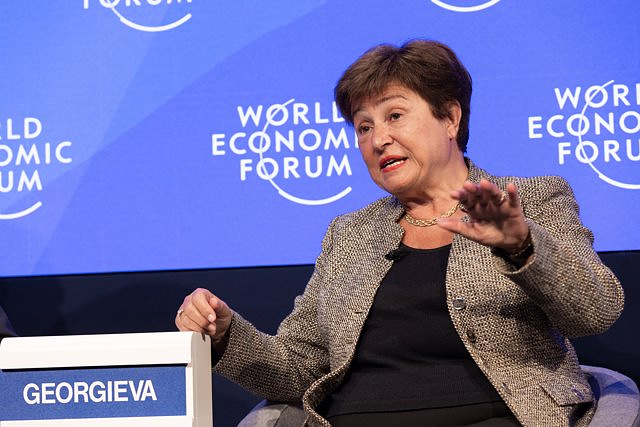MADRID, 11 Abr. (EUROPA PRESS) -
The Spanish economy will recover this year the level of activity prior to the Covid-19 pandemic, according to estimates by the International Monetary Fund (IMF), which has thus brought this milestone forward by one year, after revising its growth forecast by four tenths upwards. GDP for Spain in 2023.
According to the projections of the multilateral organization, Spain will reach a GDP level of 1,195 trillion euros in 2023, thus exceeding for the first time the 1,193 trillion of 2019, the last full year before the impact of the Covid-19 pandemic and the restrictions implemented to contain it.
In its latest annual report on the Spanish economy, published last January, the IMF expected the country to not recover its pre-pandemic GDP level until 2024.
However, in its report 'World Economic Outlook', presented this Tuesday in Washington, the institution led by Kristalina Georgieva, has revised its growth forecast for Spain this year by four tenths, up to 1.5% from 1, 1% that it managed in January, which would allow Spain to more than recover the level of activity lost during these years.
Likewise, the IMF has cooled the intensity of the economic rebound expected for 2024, when it expects GDP growth in Spain of 2%, compared to the 2.4% previously anticipated.
In the longer term, the IMF projections contemplate an expansion of 2% also for 2025, while a year later growth will moderate to 1.7% and up to 1.6% in each of the two remaining years on the horizon. of the forecasts of the institution.
Thus, Spain will continue to grow at a faster rate than the euro area average during this year and the following two, when the euro area will grow by 0.8%, 1.4% and 1.9%, respectively, while that in 2026 the euro area will expand by 1.7%, the same as Spain, which will again grow more than the euro area in 2027 and 2028, since the region will then grow by 1.5% and 1.4% , respectively.
Regarding inflation, the IMF projections suggest that the rise in prices will moderate gradually and reach an average of 4.3% this year and 3.1% the next, reducing to 2% in 2025 and from then falling to 1.8% a year later and up to 1.7% in 2027 and 2028.
In the case of the euro area, the IMF expects a slowdown to 5.3% in 2023 from 8.4% last year, moving to an average of 2.9% in 2024 and 2.2% a year later , still above the objective of the European Central Bank (ECB), which it will reach in 2026 with a rise of 2%, which in 2027 and 2028 will moderate to 1.9%.
On the other hand, the IMF forecasts for Spain contemplate that this year an employment figure of 20.547 million will be reached, which in 2024 will rise to 20.67 million employed, thus finally exceeding the level of employment observed in 2007, before the outbreak of the financial crisis that led to the Great Recession.
Despite the improvement in employment, the IMF projections keep the unemployment rate above the threshold of 12% for the entire horizon of its forecasts, with an estimated level of 12.6% this year and 12.4% the next, but in 2028 it would still be 12.1%.
Regarding public accounts, the multilateral organization expects the budget deficit to fall to 4.5% in 2023 from 6.9% last year, limiting itself to 3.5% of GDP in 2024, but picking up again a year later , with a negative imbalance of 3.8% in 2025 and 4% of GDP in each of the three remaining years of the forecasts.
In turn, although in absolute figures the Spanish public debt will not stop increasing each year, going from 1,356 trillion estimated for 2023 to 1,666 trillion in 2028, in relation to GDP the debt ratio will moderate slightly from 110 .4% of GDP projected for this year to just over 108% in 2024 to stand at 109.3% in 2028.

 Exploring Cardano: Inner Workings and Advantages of this Cryptocurrency
Exploring Cardano: Inner Workings and Advantages of this Cryptocurrency Seville.- Economy.- Innova.- STSA inaugurates its new painting and sealing hangar in San Pablo, for 18 million
Seville.- Economy.- Innova.- STSA inaugurates its new painting and sealing hangar in San Pablo, for 18 million Innova.- More than 300 volunteers join the Andalucía Compromiso Digital network in one month to facilitate access to ICT
Innova.- More than 300 volunteers join the Andalucía Compromiso Digital network in one month to facilitate access to ICT Innova.-AMP.- Ayesa acquires 51% of Sadiel, which will create new technological engineering products and expand markets
Innova.-AMP.- Ayesa acquires 51% of Sadiel, which will create new technological engineering products and expand markets Marc Márquez returns to pole in Jerez
Marc Márquez returns to pole in Jerez The CIS carries out a quick survey on Sánchez's letter to measure the reaction of citizens
The CIS carries out a quick survey on Sánchez's letter to measure the reaction of citizens 12M.- Puigdemont to Sánchez and Illa: "This is not about the future of the PSOE! What have you believed?"
12M.- Puigdemont to Sánchez and Illa: "This is not about the future of the PSOE! What have you believed?" Díaz proclaims that "the Government is not going to bow down" and asks not to be "on the defensive and locked in" against the right
Díaz proclaims that "the Government is not going to bow down" and asks not to be "on the defensive and locked in" against the right How Blockchain in being used to shape the future
How Blockchain in being used to shape the future Not just BTC and ETH: Here Are Some More Interesting Coins Worth Focusing on
Not just BTC and ETH: Here Are Some More Interesting Coins Worth Focusing on UPV students build a prototype of a wooden house to move to Equatorial Guinea
UPV students build a prototype of a wooden house to move to Equatorial Guinea The UA opens the call for the Impulso 2024 Awards for the best innovative business initiatives
The UA opens the call for the Impulso 2024 Awards for the best innovative business initiatives ALI, virtual assistant from Alicante, internationally recognized by the OECD
ALI, virtual assistant from Alicante, internationally recognized by the OECD Retrópolis brings the golden age of video games and computing to the UPV
Retrópolis brings the golden age of video games and computing to the UPV A million people demonstrate in France against Macron's pension reform
A million people demonstrate in France against Macron's pension reform Russia launches several missiles against "critical infrastructure" in the city of Zaporizhia
Russia launches several missiles against "critical infrastructure" in the city of Zaporizhia A "procession" remembers the dead of the Calabria shipwreck as bodies continue to wash up on the shore
A "procession" remembers the dead of the Calabria shipwreck as bodies continue to wash up on the shore Prison sentences handed down for three prominent Hong Kong pro-democracy activists
Prison sentences handed down for three prominent Hong Kong pro-democracy activists ETH continues to leave trading platforms, Ethereum balance on exchanges lowest in 3 years
ETH continues to leave trading platforms, Ethereum balance on exchanges lowest in 3 years Investors invest $450 million in Consensys, Ethereum incubator now valued at $7 billion
Investors invest $450 million in Consensys, Ethereum incubator now valued at $7 billion Alchemy Integrates Ethereum L2 Product Starknet to Enhance Web3 Scalability at a Price 100x Lower Than L1 Fees
Alchemy Integrates Ethereum L2 Product Starknet to Enhance Web3 Scalability at a Price 100x Lower Than L1 Fees Mining Report: Bitcoin's Electricity Consumption Declines by 25% in Q1 2022
Mining Report: Bitcoin's Electricity Consumption Declines by 25% in Q1 2022 Oil-to-Bitcoin Mining Firm Crusoe Energy Systems Raised $505 Million
Oil-to-Bitcoin Mining Firm Crusoe Energy Systems Raised $505 Million Microbt reveals the latest Bitcoin mining rigs -- Machines produce up to 126 TH/s with custom 5nm chip design
Microbt reveals the latest Bitcoin mining rigs -- Machines produce up to 126 TH/s with custom 5nm chip design Bitcoin's Mining Difficulty Hits a Lifetime High, With More Than 90% of BTC Supply Issued
Bitcoin's Mining Difficulty Hits a Lifetime High, With More Than 90% of BTC Supply Issued The Biggest Movers are Near, EOS, and RUNE during Friday's Selloff
The Biggest Movers are Near, EOS, and RUNE during Friday's Selloff Global Markets Spooked by a Hawkish Fed and Covid, Stocks and Crypto Gain After Musk Buys Twitter
Global Markets Spooked by a Hawkish Fed and Covid, Stocks and Crypto Gain After Musk Buys Twitter Bitso to offset carbon emissions from the Trading Platform's ERC20, ETH, and BTC Transactions
Bitso to offset carbon emissions from the Trading Platform's ERC20, ETH, and BTC Transactions Draftkings Announces 2022 College Hoops NFT Selection for March Madness
Draftkings Announces 2022 College Hoops NFT Selection for March Madness























